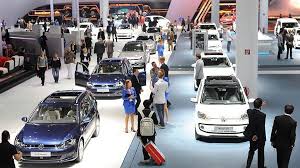Anthony Areh
Mr Jelani Aliyu, Director-General, National Automotive Design and Development Council (NADDC), has announced plans by the Federal Government to begin Electric Vehicle (EV) Pilot programme in three universities.
The institutions are the Usmanu Danfodio University, Sokoto; University of Nigeria, Nsukka and the University of Lagos.
He stated this in Abuja on Friday at the official unveiling of the Hyundai Kona car, Nigeria’s first locally-assembled 100 per cent electric car, manufactured by Stallion Group.
According to him, the programme is part of National Automotive Industry Development Plan (NAIDP) five-point comprehensive programme aimed at promoting local production of vehicles.
Aliyu said that the NADDC was in partnership with the renewable energy research centres and engineering departments of the three universities in kick-starting the pilot project.
“We are collaborating with the Usman Danfodio University, Sokoto, University of Nigeria, Nsukka and the University of Lagos.
“We have started the construction of three solar power charging stations and we shall soon be deploying a series of electric vehicles that will be used for this programme.
“We intend to set up a monitoring and evaluation unit comprising of the NADDC, the academia and the representatives of the private sector, especially those who have produced these electric vehicles we shall be using.
“The whole objective is to promote the understanding of advance technology among Nigeria youths because any nation that has succeeded is the one were practical knowledge is given priority.
“It’s not only about what you have read and your certificate, but what you are able to do practically to add value and make a difference to your life and the society,” he said.
The NADDC boss said that EVs have far less parts/components, and will require less maintenance.
Aliyu added that the limited number of needed components would allow Nigerian companies to achieve higher percentage of local content.
“We are working with relevant stakeholders to ensure that this type of technology is effectively deployed in Nigeria.
“As a result of our collaborative efforts, Hyundai Nigeria is unveiling its EVs which is a significant milestone in the automotive sector in Nigeria.
“We will continue to work with other government agencies and stakeholders to ensure that maximum benefit is achieved.
“Nigeria is signatory to the 2016 Paris Accord which mitigates greenhouse gas emissions, and EVs will allow us to meet those targets and provide cleaner air/environment for our people.
“We are blessed with intelligent and innovative youth in the ICT sector, EVs with their embedded computerized systems will now have huge opportunity to be employed and productive,” he said.
In his goodwill message, Otunba Niyi Adebayo, Minister of Industry, Trade and Investment, congratulated the Stallion Group and its subsidiary, Hyaundai Nigeria for introducing the first EV into the Nigeria market.
“This is the first electric car that we are seeing here, and the Federal Government is willing to provide the enabling environment for this technology to thrive.
“On behalf of the Federal Government, I commend Hyundai for this initiative, as we continue to support this noble idea,” he said.
The Chief Executive Officer of Stallion Group, Mr Anant Badjatya, said that the electric car comes with zero emission, and can be charged both at home and workplace.
He said the materials used to assemble Nigeria’s First EV was mostly sourced locally.
According to him, when fully charged for nine hours, the car can go a distance of 482km before recharging.
He therefore commended the Federal Government, especially the NADDC, for providing support investors and its easy of doing business policy.
“We are working to ensure that we do more work on the new product and make it more cheaper for Nigerians.
“Right now the most important thing is for us to understand that we need to embrace the future, because this is the future of automobile.
“We cannot wish it away, because the entire world is now embracing EVs as they want to get away from the diesel and petrol engines.
“The good thing about Nigerians is that they are very innovative, they can embrace and enjoy this technology,” he said.




